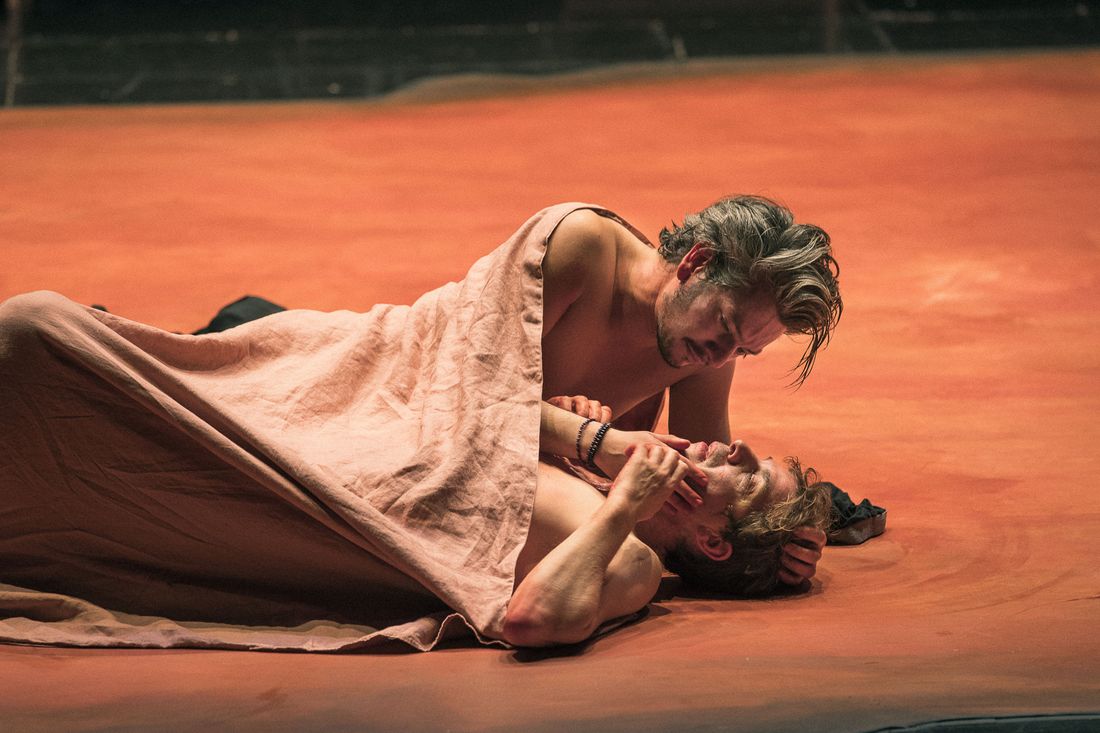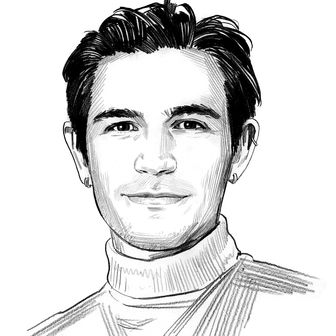
“I call it the marathon into hell,” says Ramsey Nasr. The race is a four-hour adaptation of Hanya Yanagihara’s 2015 novel, A Little Life, and the hell is the emotional landscape of Jude St. Francis, the story’s protagonist, whom he’s been playing since 2018. This adaptation, directed by Ivo van Hove, premiered in Amsterdam four years ago and is only now coming to the city where its action takes place via the Brooklyn Academy of Music. Like the book, it’s not an easy experience. Nasr portrays Jude as someone who is as much a wound as he is a person, as much a literary victim as Tess of the d’Urbervilles or the biblical Job, a man so cloaked in pain that his continued existence is itself shocking. “We’re talking about people who cut themselves, people who have depressions, people who are in abusive relationships, and people who commit suicide or do attempt,” he says. “That’s a whole bundle of bruisedness.”
Yet that damage is just one part of A Little Life, a book marked not only by its agony but by its detail. Small aspects of life and lifestyle compound upon one another: Food, art, and scenery are described but not judged. Intense, overwhelming sadness occurs in the same tone as great love and mediocre pho. “She writes it so elaborately — how they eat, what they do, to which music they listen, where they are — that at some point you would think, Well, you could condense that a little bit,” Nasr says. “But because you know all this, because you are being confronted with all this information about how they walk — all this extra information — in the end, when you close the book, you have the feeling that this is a living character, that it’s not fiction. And that’s the miracle of what she did.”
Onstage, these details must give way to something more recognizably plotlike. “In the theater, of course, there’s the beginning, middle, and an end,” says van Hove. The production may be four hours long, but that still required the first 80 pages of the book to be turned into just ten minutes of performance. Jude, who van Hove estimates cuts himself “20 times or something” in the novel, does so three or four times here. “Otherwise, it becomes too much, and then it becomes only about that.”
In this streamlining, the impulse was to hit the “big events” — the deaths, the suicide attempts, the sacrifices — resulting in less sitting in on the friendship of the novel’s four main characters, Jude, Willem, JB, and Malcolm. The adaptation is “very geared towards Jude, which is logical,” Maarten Heijmans, who plays Willem, says. “But you don’t have all the backdrop, the little dinners they have, the little jokes they make. I tried to bring that back as much as I could, but my influence is limited because I’m just an actor.”
What van Hove and his translator, Koen Tachelet, have preserved is the novel’s punishing nature. (Depictions of physical miseries aside, the audience has to multitask for the entirety of the long and difficult running time: They must read the Dutch-to-English subtitles, watch the actors, and cry all at once.) Sometimes, van Hove notes, “People go out, come back, because it’s too much.” In a way, that, too, protects the experience of the novel — they may not be able to experience the bruisedness to the extent of Jude or even Nasr, but they are experiencing a punishment of their own. “My theater is really visceral,” van Hove says. “The people in the audience must be horrified. When Willem dies, your hair should stand still.”
In fact, van Hove has put some audience members literally into the play, seating them onstage, forcing the rest of the crowd to watch them react while they face the people watching them. “It creates a conspiracy,” he says. “You’re watching something that’s too horrible to be true, which you shouldn’t watch, and you see everybody doing the same thing. It creates a kind of togetherness, a real intimacy, that we are all together in this intimate world of Jude with his friends.”
Not despite the brutality but because of it, people who relate to Jude have connected to this onstage expression, deeply so. Nasr and Heijmans describe regularly being approached by audience members who have scars from cutting themselves or have been abused or are in a relationship in which one partner no longer wants to live. After each show, “there are people,” Heijmans says, “who’ve had a cleansing, religious experience.”


